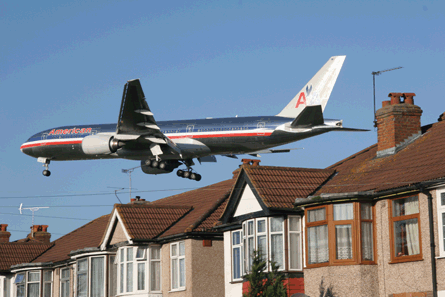Aviation will come under the spotlight like no other sector this year - a bellwether of the will, or the lack of it - to secure a workable framework on arresting global warming.
Billed as one of the most important years for climate change since the Kyoto Protocol set signatory state targets for cutting carbon dioxide emissions in 2001, the next 12 months will demonstrate how aviation's rule-setting body the International Civil Aviation Organisation plans to keep international air transport's house in order.
Although international aviation was not included in the Kyoto Protocol, ICAO has been charged with achieving industry consensus on the ways and means of harnessing the industry's effects on climate change. And, when it comes up with a plan, ICAO will also have to demonstrate that vision on the world stage at the United Nations Framework Convention on Climate Change conference in Copenhagen, where the post-2012 deal will be hammered out at the end of 2009.
Europe - which has driven the short-term agenda with a new controversial law that will see international aviation trading carbon credits from 2012 - has warned that should ICAO fail to deliver on tabling any effective action, the industry will have the responsibility taken out of its hands.
 |
|---|
© KPA/Zuma/Rex Features |
Members of ICAO's Group on International Aviation and Climate Change (GIACC), the 15-member group tasked with the brainstorming, have been toiling for months on ways in which global aviation can set universally agreed fuel efficiency goals, establish mechanisms for achieving that efficiency and, vitally, a way to determine how progress will be measured.
LOOKING FOR CONSENSUS
It is to report in February at its third summit and will present its ideas to the 187th session of the ICAO council in July, which will allow a high-level committee to determine areas of consensus. It will be at a further session of the ICAO council in October, where it will frame what global aviation can reasonably take to the Copenhagen meeting.
While Europe believes a failure on the part of ICAO to advance with a positive message runs real risks, environmentalists who track aviation at this level - often as official observers - say ICAO needs to demonstrate leadership and not simply follow the International Air Transport Association's line on carbon neutral growth. So expect the observers to scrutinise how ICAO will turn GIACC's recommendations into a global response that satisfies Copenhagen.
Kyoto is said to have failed because the USA refused to ratify the treaty, partly because it made no demands on China. And, in similar fashion, fault lines run under the issue of imposing market-based mechanisms such as emissions-based trading on the airlines of developing nations.
In the run-up to Copenhagen, expect to see horsetrading over a possible political deal between industrialised first-world countries that want global measures such as a universal emissions trading scheme and developing nations that will demand access to the funds raised from such a scheme, allowing them to adapt better to climate change.
Regardless of promises to the world's poorest, the developed world's airlines have shown little indication of warming to the European Union emissions trading scheme, and the spectre of a transatlantic legal challenge over the scheme's extra-territoriality implications still hovers.
Washington's emerging role as a potential Kyoto player will be crucial. Armed with a newly minted mandate commitment, the new US administration has pledged to oversee the introduction of federal carbon-emissions cuts through a European-style cap-and-trade scheme.
GREEN FRUSTRATION
Nevertheless, the pace of change may fail to satisfy. Even the more pragmatic green constituents acknowledge that while the USA's take on Kyoto may prove positive under a new administration, the response may not be as instantaneous as they would like. The debate is likely to roll on into 2010.
The European Commission, meanwhile, has produced the ambitious "20/20/20 by 2020" plan: emissions cuts of 20% over 1990 levels allied to a 20% gain in energy efficiency and 20% of energy from renewables by 2020. For Europe's industrial plants this means far higher levels of auctioning. Aviation, meanwhile, will enter the scheme from 2012.
Even an initial 15% auctioning for international aviation is pegged at costing an annual €5 billion ($7 billion). And that bad dream could have turned into a nightmare if the European Parliament's environment committee had succeeded in hijacking the legislation and securing a commitment to runaway auctioning levels before it was even enacted.
Aviation, alarmed at the prospect of future auctioning levels creeping far higher, seems to have won a reprieve - at least until the next revision of the directive - following the late December vote by the European Parliament. This omitted aviation from the revised emissions trading "mother" directive with its hugely ambitious post-2012 vision to meet the 20/20/20 targets.
In 2009, expect Brussels to lose more friends with the postponed NOx flanking measures and new noise rules set to be formally proposed during the first semester. Also, in January, the EC will define the country that non-EU airlines will have to deal with to oversee their participation in the European trading scheme. This will be the country to which they fly most often. Historical data will be required to determine allowances, with reporting expected to begin around mid-year. Despite the tortuous complexities involved, an early understanding of the requirements will be critical.
On a more speculative note, aviation risks finding itself once again an easy revenue-raising target as several countries attempt to sneak in new ticket taxes as the economic crisis deepens. Do not forget that this is one of the easiest honeypots into which governments dip when fiscal receipts look fragile. Belgium, Germany and some Nordic countries are understood to be likely villains. More airports may also introduce environmentally differentiated charges following Sweden, Switzerland, the London airports and Frankfurt.
 |
|---|
© MKJ/Flight International |
Elsewhere, keep an eye on London Heathrow's expansion aspirations to build a third runway. The UK transport minister late last year delayed the decision until January to allow more time to consider evidence. The controversial expansion plan has been the subject of two consultations. One detailed options to increase Heathrow's capacity - including the addition of a third runway - while the second considered the impact of development on the surrounding population.
This is something that the green lobby says will serve to show the pressure of local environmental concerns, the influence of politics and whether the economic case always wins in the end.
Source: Flight International























